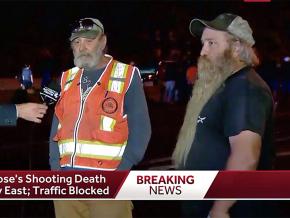What does a racist look like?
asks why so many people were surprised to hear white truckers express sympathy with a Black teen who was killed by police, in an article for his blog Chitucky.
A MOVEMENT — and a moment — has made it possible for breakthroughs on the question of racism in the U.S. working class, even among white workers typically suspected of deep racism.
A video interview of truck drivers left stranded by Pittsburgh street protests in the wake of Antwon Rose’s murder by city police has the internet’s jaw dropping. Action News reporter Beau Berman talked to Gene and Robert as protesters blocked traffic on a Pittsburgh highway. The punchline of the story, watchers were surprised to find, was that the two white, bearded truck drivers stood unequivocally on the side of the protesters.
Early in the interview, one of the truck drivers says, “The officer was dead wrong — and he took a life. A life that shouldn’t have been taken.”
The drivers were stopped by the protest for more than four and a half hours. When Beau Berman asked, “You are stuck here...Is it frustrating or are you okay with it?” Robert responded, “Yeah, I’m good with it, man. I think they’re doing a good thing, and they’re going to get their point across. And that’s good.”

Gene, the other driver on the scene, refused to shift the blame to the fact that Antwon Rose ran from the police: “Seventeen-year-old, scared — your instincts just take over. But there was no reason to be shot.”
By the end of the interview, the drivers clearly identified with the message of the protesters, remarking, “We want action.”
Finally, when comparing their minor inconvenience because of the road blockade, the drivers sympathized with the torment of families of those killed by the cops.
THE VIDEO quickly went viral. On writer Shaun King’s Facebook thread, an early commenter set the tone for much of the discussion: “I stereotyped these men and thought they were gonna make excuses for the cop.”
While another wrote, “I have learned that not all ‘Bubbas’ think like you think they do.”
And still another was blown away: “OMG! I prejudged them but boy did they change my mind on how I judge guys who look like them. Definitely wasn’t expecting them to make actual sense.”
Why the surprise? The fact that they were white? Or that they were white truck drivers? Or perhaps that they were white truck drivers with lots of beard? Maybe an element of essentializing?
The everyday racist violence perpetrated against people of color — whether separating families, murder by the police, or housing discrimination — should always be a focus for serious activists fighting for a better world.
Alongside our focus against racism, we need to understand the realities of working-class people who happen to be white. Beau Berman asked very little personal information about Gene or Robert. Instead of the uninformed assumptions about these guys, Gene and Robert likely have complex lives and social relationships in their home, at work, in the sports or music they enjoy, or where their kids go to school.
In some, many or all of these relationships, Gene and Robert probably talk about the news: Donald Trump, family separations, police shootings, Colin Kaepernick and other things. They likely have Black folks in their extended families. They’ve probably sympathized with families that have had their children snatched by Immigration and Customs Enforcement. They’ve witnessed over-the-road trucking become “sweatshops on wheels“ as transportation companies make out like bandits.
So why wouldn’t they sympathize with the protesters?
FROM #BlackLivesMatter to #MeToo, hashtags have often served to raise consciousness and mobilize people into the streets. The obscene racism of #BBQBecky and #PermitPatty have exposed everyday racism while ruthlessly ridiculing the reactionaries.
On the other end of the spectrum, the obtuseness of internet hashtags like #NotAllWhitePeople have merely reinforced the perception, in the broadest strokes possible, of a white working class that is insufferably and irredeemably racist.
But it’s not true. Just as not all white people play tennis, not all white people are calling the cops on their neighbors. Indeed, there are lots of white people who get the cops called on them, while hundreds have been shot or murdered by the police in this country. In all likelihood, Gene or Robert have run from the police themselves at some point.
Working-class white people are not immune to the social movements and protests of our time. Many have participated and helped to organize them. Ultimately, isn’t that the point of building our movements — to build consciousness and involve more people?
Robert and Gene, unlike most working-class people, were given a few minutes to express their point of view in the mainstream media. Rather than being surprised that what they said “made sense,” let’s instead raise our expectations and understand that our work in movements has an effect. Regular people, including the “Bubbas,” are paying attention.
First published at Chitucky.


